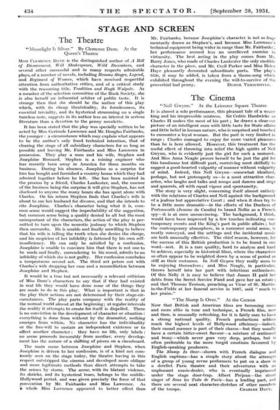STAGE AND SCREEN The Theatre
"Moonlight Is Silver." By Clemente Dane. At the Queen's Theatre MISS CLEMENCE DANE is the distinguished author of A Bill of Divorcement, IVill Shakespeare, Wild Decembers, and several other successful and in many respects admirable plays, of a number of novels, including Broome Stages, Legend, and Regiment of Women, which have received respectful attention from authoritative critics, and of a critical study with the reassuring title, Tradition and Hugh Walpole. As a member of the selection committee of the Book Society, she is also herself an influential arbiter of public taste. It is strange then that she should be the author of this play which, with its cheap theatricality, its formlessness, its essential triviality, and its hysterical strumming on a single tuneless note, suggests in its author less an interest in serious literature than a devotion to the penny novelette.
It has been stated that the play was specially written to be acted by Miss Gertrude Lawrence and Mr. Douglas Fairbanks, the younger : a circumstance which may explain what appears to be the author's only fixed technical intention, that of clearing the stage of all subsidiary characters for as long as possible and leaving Mr. Fairbanks and Miss Lawrence in possession. They play a man and his wife, Stephen and Josephine Ronsard. Stephen is a mining engineer who has recently been away in America for three months on business. During his absence, Josephine as a surprise for him has bought and furnished a country house which they had admired together before he left. She has been assisted in the process by a friend, Charles Lankester, and, the essence of the business being the surprise it will give Stephen, has not disclosed to anyone the many hours she has spent alone with Charles. On his return Stephen finds that Charles's wife is about to sue her husband for divorce, and that she intends to cite Josephine. Charles's character being what it is, com- mon sense would suggest the improbability of the suggestion, but common sense being a quality denied to all but the most unimportant of the characters, the action of the play is per- mitted to turn upon the neurotic jealousy to which Stephen then succumbs. He is unable and finally unwilling to believe that his wife is telling the truth when she denies the charge, and his suspicion of her infidelity is fattened by his own self- insufficiency. He can only be satisfied by a confession. Josephine is unable to convince him that there is not one to be made and finally, surrendering to his mood, admits to an infidelity of which she is not guilty. Her confession concludes a tempestuous second act. The third act peters out with Charles's wife dropping her case and a reconciliation between Josephine and Stephen.
It would be a true but not necessarily a relevant criticism of Miss Dane's characters to say that if they had existed in real life they would have done none of the things they are made to do in this play. What is important is that in the play their actions are not determined by their stage-cir- cumstances. The play parts company with the reality of the normal world almost at the beginning ; at regular intervals the reality it attempts to create for itself is dispelled. There is no conviction in the development of character or situation : everything is done from without by the dramatist, nothing emerges from within. No character has the individuality or the free-will to sustain an independent existence or to affect another character ; they have no life, only labels : no scene proceeds inexorably from another, every develop. ment has the nature of a shifting of pieces on a chessboard.
The main scene between Josephine and Stephen, when Josephine is driven to her confession, is of a kind not com- monly seen on the stage today, the theatre having in this respect outstripped the cinema and developed more oblique and more legitimate methods than direct attempts to take the senses by storm. The scene, with its blatant violence, its shrieks, and its hysterical tears, belongs to the middle- Hollywood period, and was given precisely the force of that convention by Mr. Fairbanks and Miss Lawrence. As a whole Miss Lawrence appeared to better effect than Mr. Fairbanks, because Josephine's character is not so frag. mentarily drawn as Stephen's, and because Miss Lawrence's technical equipment being wider in range than Mr. Fairbanks', her performance seemed less an unrelieved exercise in virtuosity. The best acting in the play comes from Mr. Barry Jones, who made of Charles Lankester the only credible character in the piece, and Mr. Cecil Parker and Miss Helen Haye pleasantly decorated subordinate parts. The play's title, it may be added, is taken from a theme-song which exhibited throughout the evening the will-to-survive of the


















































 Previous page
Previous page